2016年北京市西城区初三一模英语试卷
2016年西城区初三一模试卷英语(word解析版)
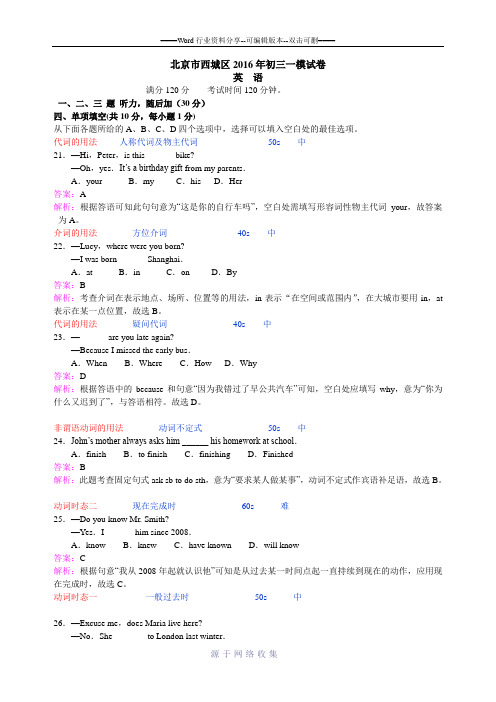
北京市西城区2016年初三一模试卷英语满分120分考试时间120分钟。
一、二、三题听力,随后加(30分)四、单项填空(共10分,每小题1分)从下面各题所给的A、B、C、D四个选项中,选择可以填入空白处的最佳选项。
代词的用法人称代词及物主代词50s 中21.—Hi,Peter,is this ______ bike?—Oh,yes.It’s a birthday gift from my parents.A.your B.my C.his D.Her答案:A解析:根据答语可知此句句意为“这是你的自行车吗”,空白处需填写形容词性物主代词your,故答案为A。
介词的用法方位介词40s 中22.—Lucy,where were you born?—I was born ______ Shanghai.A.at B.in C.on D.By答案:B解析:考查介词在表示地点、场所、位置等的用法,in表示“在空间或范围内”,在大城市要用in,at 表示在某一点位置,故选B。
代词的用法疑问代词40s 中23.—______ are you late again?—Because I missed the early bus.A.When B.Where C.How D.Why答案:D解析:根据答语中的because和句意“因为我错过了早公共汽车”可知,空白处应填写why,意为“你为什么又迟到了”,与答语相符。
故选D。
非谓语动词的用法动词不定式50s 中24.John’s mother always asks him ______ his homework at school.A.finish B.to finish C.finishing D.Finished答案:B解析:此题考查固定句式ask sb to do sth,意为“要求某人做某事”,动词不定式作宾语补足语,故选B。
动词时态二现在完成时60s 难25.—Do you know Mr. Smith?—Yes.I ______ him since 2008.A.know B.knew C.have known D.will know答案:C解析:根据句意“我从2008年起就认识他”可知是从过去某一时间点起一直持续到现在的动作,应用现在完成时,故选C。
北京市西城区2016年中考一模英语试卷(含答案)
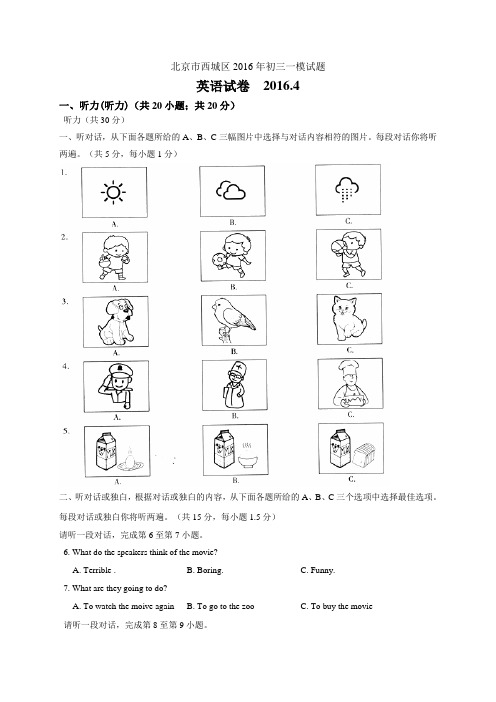
北京市西城区2016年初三一模试题英语试卷2016.4一、听力(听力)(共20小题;共20分)听力(共30分)一、听对话,从下面各题所给的A、B、C三幅图片中选择与对话内容相符的图片。
每段对话你将听两遍。
(共5分,每小题1分)二、听对话或独白,根据对话或独白的内容,从下面各题所给的A、B、C三个选项中选择最佳选项。
每段对话或独白你将听两遍。
(共15分,每小题1.5分)请听一段对话,完成第6至第7小题。
6. What do the speakers think of the movie?A. Terrible .B. Boring.C. Funny.7. What are they going to do?A. To watch the moive againB. To go to the zooC. To buy the movie请听一段对话,完成第8至第9小题。
8. What did the girl buy?A. A dogB. A walletC. A picture9. How much did the girl pay?A. $20.B. $25.C. $40.请听一段对话,完成第10至第11小题。
10. What‘s wrong with the man?A. He has a feverB. He has a headacheC. He has a toothache11. What does the woman suggest doing?A. Having a good rest.B. Taking his temperature.C. Taking some medicine.请听一段对话,完成第12至第13小题。
12. Why does the woman want to see Paul?A. He doesn‘t do well in his studiesB. He doesn‘t practice soccer after classC. He doesn‘t want to volunteer at school13. What does Paul decide to do?A. To get up earlyB. To stop watching TVC. To give up his job请听一段独白,完成第14至第15小题。
Word版2016北京西城英语一模试题
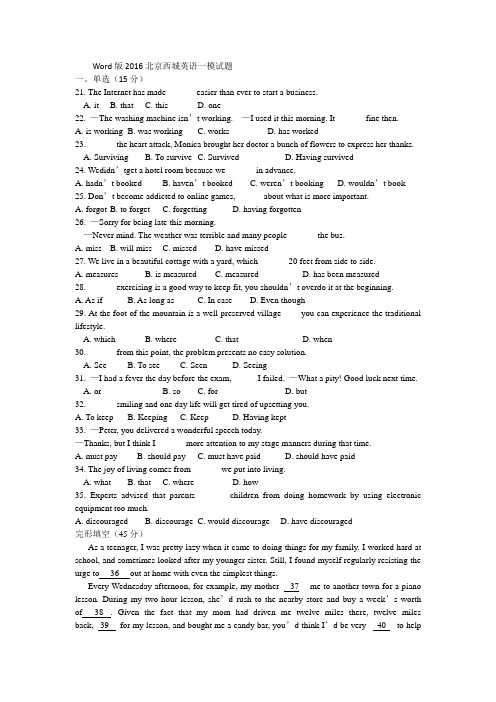
Word版2016北京西城英语一模试题一。
单选(15分)21. The Internet has made ______ easier than ever to start a business.A. itB. thatC. thisD. one22. —The washing machine isn’t working. —I used it this morning. It ______ fine then.A. is workingB. was workingC. worksD. has worked23. ______ the heart attack, Monica brought her doctor a bunch of flowers to express her thanks.A. SurvivingB. To surviveC. SurvivedD. Having survived24. Wedidn’tget a hotel room because we ______ in advance.A. hadn’t bookedB. haven’t bookedC. weren’t bookingD. wouldn’t book25. Don’t become addicted to online games, ______about what is more important.A. forgotB. to forgetC. forgettingD. having forgotten26. —Sorry for being late this morning.—Never mind. The weather was terrible and many people ______ the bus.A. missB. will missC. missedD. have missed27. We live in a beautiful cottage with a yard, which ______ 20 feet from side to side.A. measuresB. is measuredC. measuredD. has been measured28. ______ exercising is a good way to keep fit, you shouldn’t overdo it at the beginning.A. As ifB. As long asC. In caseD. Even though29. At the foot of the mountain is a well-preserved village ____you can experience the traditional lifestyle.A. whichB. whereC. thatD. when30. ______ from this point, the problem presents no easy solution.A. SeeB. To seeC. SeenD. Seeing31. —I had a fever the day before the exam, _____ I failed. —What a pity! Good luck next time.A. orB. soC. forD. but32. ______ smiling and one day life will get tired of upsetting you.A. To keepB. KeepingC. KeepD. Having kept33. —Peter, you delivered a wonderful speech today.—Thanks, but I think I ______ more attention to my stage manners during that time.A. must payB. should payC. must have paidD. should have paid34. The joy of living comes from ______ we put into living.A. whatB. thatC. whereD. how35. Experts advised that parents ______ children from doing homework by using electronic equipment too much.A. discouragedB. discourageC. would discourageD. have discouraged完形填空(45分)As a teenager, I was pretty lazy when it came to doing things for my family. I worked hard at school, and sometimes looked after my younger sister. Still, I found myself regularly resisting the urge to 36 out at home with even the simplest things.Every Wednesday afternoon, for example, my mother 37 me to another town for a piano lesson. During my two-hour lesson, she’d rush to the nearby store and buy a week’s worth of 38 . Given the fact that my mom had driven me twelve miles there, twelve miles back, 39 for my lesson, and bought me a candy bar, you’d think I’d be very 40 to helpher bring the groceries into the house. 41 I wasn’t. I generally just brought in an armload and left the 42 for Mom as I ran to my room, shut the door, and started studying.Don’t get me wrong: even back in my room, I felt 43 about not helping my mother more. Deep inside, I wanted to change my 44 . But I also realized that once I did change, there’d be no going back. 45 I took on more responsibility, my parents would start 46 more of me. At age fifteen, I sensed that this one small change would 47 something much bigger: my personal change from a cared-for, spoiled (被宠坏的) childto a more 48 , caring and giving young man.I’ll never forget the Wednesday when I made a(n) 49 to jump in and see what happened. Returning home from the 50 , I disappeared into my room, as usual. But once inside, I felt that deep and burning 51 . Throwing my school books on the bed, I suddenly opened my door and 52 back to the garage to help my mother. How happy I felt that day!Surely, over time, I continued to help out with more housework. The neat thing was, the more I helped out, the 53 I felt about myself and my place in my family. As Mom and Dad realized they could 54 on me more, our trips became far less stressful, too. In short, it was a win-win situation for everyone.Sometimes the little things we put off doing the longest 55 out to be the simplest things to complete. And feeling happy beats feeling guilty any day.36.A. help B. cry C. start D. work37.A. sent B. drove C. walked D. guided38.A. fruits B. flowers C. groceries D. vegetables39.A. paid B. fought C. applied D. planned40.A. nervous B. grateful C. confident D. unwilling41.A. So B. And C. Thus D. But42.A. one B. other C. next D. rest43.A. excited B. curious C. guilty D. doubtful44.A. way B. world C. career D. shape45.A. Since B. Though C. Unless D. Once46.A. warning B. reminding C. expecting D. informing47.A. tell B. mark C. express D. describe48.A. energetic B. ambitious C. outgoing D. responsible49.A. excuse B. decision C. statement D. appointment50. A .duty B. store C. lesson D. holiday51. A. anger B. shame C. delight D. pleasure52. A. called B. looked C. headed D. handed53.A. better B. smarter C. warmer D. stronger54.A. live B. press C. focus D. count55.A. turn B. make C. point D. bring阅读理解(30分)ADear Ms. Wang,I am writing to inform you of some arrangements about my composition course and Latin course next year.I’ve decided to re-establish the 5-paragraph essay as the goal for the composition course. Iinterviewed some of my former students and they all agreed that being able to write critically and continuously was important to them.So next academic year, Term 1 will be like always: sentences to paragraphing. And Term 2 will work toward the 5-paragraph essay. The final 3 weeks of Term 2 will be reserved to introduce writing for TOEFL and CEE. By that time, if the students have done their job correctly, then they should be able to write quite well.As for the Latin course, I will post notices around campus next week so that the students will understand what’s on offer before I actually introduce the course. A number of students already emailed me about the course.I am sure you don’t understand what a big deal our opening this program at our school is. People around the world are interested in what we plan to do. There are many rewards available to the students who succeed in the course. Please share what I have said with the administration. I want them to understand the importance of this course. The reason I have contacted these colleagues (actually Oxford contacted me) is that I have confidence in our students and in myself.I know that when those professors meet our students and hear them speaking and reading Latin, they are going to be amazed. It will open all sorts of doors for students that they never even thought of knocking on.Well, that’s it for now. I’ll see you soon.Yours,Edward Johnson56. According to the letter, what will Edward teach about writing in Term 1?A. Critical thinking.B. 5-paragraph essay.C. Sentences to paragraphing.D. Writing for TOEFL and CEE.57. We can learn from the letter that Edward’s Latin course______.A. has aroused students’interestB. enjoys a nationwide reputationC. has won a number of awardsD. benefits anyone who takes it58. Why does Edward write this letter?A. To seek assistance from the administrationB. To inform the school of his course plans.C. To show his achievements in LatinD. To apply for the teaching position.BI was desperately nervous about becoming car-free. But eight months ago our car was hit by a passing vehicle and it was destroyed. No problem, I thought: we’ll buy another. But the insurance payout didn’t even begin to cover the costs of buying a new car—I worked out that, with the loan (贷款) we’d need plus petrol, insurance, parking permits and tax, we would make a payment as much as £600 a month.And that’s when I had my fancy idea. Why not just give up having a car at all? I live in London. We have a railway station behind our house, a tube station 10 minutes’walk away, and a bus stop at the end of the street. A new car club had just opened in our area, and one of its shiny little red Peugeots was parked nearby. If any family in Britain could live without a car, I reasoned, then surely we were that family.But my new car-free idea, sadly, wasn’t shared by my family. My teenage daughters were horrified. What would their friends think about our family being “too poor to afford a car”? (I wasn’t that bothered what they thought, and I suggested the girls should take the same approach.) My friends, too, were astonished at our plan. What would happen if someone got seriously illovernight and needed to go to hospital? (an ambulance) How would the children get to and from their many events? (buses and trains) People smiled as though this was another of my mad ideas, before saying they were sure I’d soon realize that a car was a necessity.Eight months on, I wonder whether we’ll ever own a car again. The idea that you “have to”own a car, especially if you live in a city, is all in the mind. I live—and many other citizens do too —in a place that has never been better served by public transport, and yet car ownership has never been higher. We worry about rising car costs, but we’d be better off asking something much more basic: do I really need a car? Certainly the answer is no, and I’m a lot richer because I dared to ask the question.59. The author decided to live a car-free life partly because ______.A. most families chose to go car-freeB. he was hurt in a terrible car accidentC. the cost of a new car was too muchD. the traffic jam was unbearable for him60. What is the attitude of the author’s family toward his plan?A. Supportive.B. Disapproving.C. Optimistic.D. Unconcerned.61. What did the author suggest his daughters do about their friends’opinion?A. Argue against it.B. Take their advice.C. Think it over.D. Leave it alone.62. What conclusion did the author draw after the eight-month car-free life?A. Life cannot go without a car.B. Life without a car is a little bit hard.C. His life gets improved without a car.D. A car-free life does not suit everyone.CIn colleges around the country, most students are also workers.The reality of college can be pretty different from the images presented in movies and television. Instead of the students who wake up late, party all the time, and study only before exams, many colleges are full of students with pressing schedules of not just classes and activities, but real jobs, too.This isn’t a temporary phenomenon. The share of working students has been on the rise since the 1970s, and one-fifth of students work yearround. About one-quarter of those who work while attending school have both a full-course load and a full-time job. The arrangement can help pay for tuition (学费) and living costs, obviously. And there’s value in it beyond the direct cause: such jobs can also be critical for developing important professional and social skills that make it easier to land a job after graduation. With many employers looking for students with already-developed skill sets, on-the-job training while in college can be the best way to ensure a job later on.But it’s not all upside. Even full-time work may not completely cover the cost of tuition and living expenses. The study notes that if a student worked a full-time job at the federal minimum wage, they would earn just over $15,000 each year, certainly not enough to pay for tuition, room, and board at many colleges without some serious financial aid. That means that though they’re sacrificing time away from the classroom, many working students will still graduate with at least some debt. And working fulltime can reduce the chance that students will graduate at all, by cutting into the time available for studying and attending classes.There is little reward for attending but not finishing college. Students who wind up leaving school because of difficulty in managing work and class are likely to find themselves stuck in some of the same jobs they might have gotten if they hadn’t gone at all. The difficulty of working too much while in school can create a cycle that pushes students further into debt without receiving any of the financial or career benefits.63. According to the passage, the reality of college students is that ______.A. they throw parties a lotB. they stay up late every nightC. they pay no attention to examsD. they work besides attending classes64. What is the indirect cause of an increasing number of working students?A. The need of developing social networks.B. The lack of summer jobs for young adults.C. The chance of finding a job after graduation.D. The expenses of high tuition and living costs.65. We can learn from the passage that ______.A. working students are more likely to finish collegeB. students can cover their college expenses through workingC. students receive a huge reward for managing work and classD. dropping out of college may not help students get career benefits66. What is the best title for the passage?A. The Difficulties of Landing a JobB. The Struggle of Work-School BalanceC. The Reward of Working While StudyingD. The Images of Working College StudentsDDespite the anxiety that Jones’Host—said by some to be the first digital novel—caused in 1993, publishers weren’t too concerned that e-books would one day replace printed books. However, that attitude was changed suddenly in 2007 when Amazon’s Kindle came onto the market, which led to e-book sales jumping up to 1,260%. Since then, e-books’popularity has continued to steadily rise. The publishing industry seemed to have lost all possible ability to regain its position. Will printed books eventually become a thing of the past?According to Mike Shatzkin, founder and CEO of the Idea Logical Company, printed books just for plain old reading will, in 10 years from now, be unusual. “Not so unusual that a kid will say, ‘Mommy, what’s that?’but unusual enough that on the train you’ll see one or two people reading something printed, while everyone else is reading off of a tablet.”And Shatzkin believes that the demise of print is sure to happen, though such a day won’t arrive for perhaps 50 to 100 or more years.Robert Stein, founder of the Institute for the Future of the Book, however, believes that books won’t disappear entirely, at least not anytime soon. “Print will exist, but it will be in a different field and will appeal to a very limited audience, as poetry does today. Like woodblock printing, hand-processed film and folk weaving (编织), printed pages may assume an artistic value,”he says. He imagines that future forms of books might be developed not by conventional publishers but by the gaming industry. He also predicts that the distinction between writer and reader will be made less obvious by a social reading experience in which authors and consumers can digitally interact with each other to discuss any passage, sentence or line.Is there anything we risk sacrificing, should print really disappear entirely? According to Maryanne Wolf, director of the Center for Reading and Language Research at Tufts University, electronic reading can negatively affect the way the brain responds to text, including reading comprehension, focus and the ability to maintain attention to details like plot and order of events. “My worry is that we’ll have a short-circuited reading brain, excellent for gathering information but not necessarily for forming critical, analytical deep reading skills,”Wolf says.The field, however, is in an early stage, and findings about the negative effects of e-reading are far from certain. In light of this, Wolf hopes that we continue to maintain a “bi-literate”society—one that values both the digital and printed word. “A full reading brain circuit is a huge contribution to the intellectual development of our species. Anything that threatens that deserves our attention.”67. How did publishers feel about the rising e-book sales inspired by the Kindle?A. Worried.B. Excited.C. Curious.D. Skeptical.68. The underlined word “demise”in Paragraph 2 probably means ______.A. riseB. deathC. growthD. decline69. According to Robert Stein, paper books will exist because of ______.A. the artistic valueB. the digital interactionC. the growing popularityD.the conventional design70. It can be concluded from the last two paragraphs that Wolf holds that _______.A. e-reading will weaken the power of our brainB. digital books and paper books should not co-existC. e-reading will make us more critical and thoughtfulD. we should not risk losing a full reading brain circuit七选五(10分)Third-Culture KidsDid you grow up in one culture, your parents came from another, and you are now living in a totally different country? If so, then you are a third-culture kid!The term “third-culture kid”(or TCK) was coined in the 1960s by Dr. Ruth. She first came across this phenomenon when she researched North American children living in India. Caught between two cultures, they form their very own. 71 About 90 percent of them have a university degree, while 40 percent pursue a postgraduate or doctor degree. They usually benefit from their intercultural experience, which helps them to grow into successful academics and professionals.72 In fact many hardships may arise from this phenomenon. A third-culture kid may not be able to adapt themselves completely to their new surroundings as expected. Instead, they may always remain an outsider in different host cultures.Max, for example, experienced this fundamental feeling of strangeness throughout his life as a third-culture kid. 73 While this can be a way to create a network of friends all around the world, it can be difficult for a third-culture kid like Max to maintain close friendships and relationships.For a third-culture kid, it is often easier to move to a new foreign country than to return to their “home”country. After living in Australia and South Korea for many years, Louis finally returned to Turkey as a teenager. But she felt out of place when she returned to the country where she was born. 74 She did not share the same values as her friends’even years after going back home.While a third-culture kid must let go of their identity as foreigner when he/she returns, the home country can prove to be more foreign than anything he/she came across before. The peer group they face does not match the idealized image children have of “home”. 75As a part of the growing “culture”, TCKs may find it a great challenge for them to feel at home in many places.A. Yet being a third-culture kid is not always easy.B. In general, they often reach excellent academic results.C. This often makes it hard for them to form their own identity.D. However, their parents can help them see the opportunities of a mobile lifestyle.E. Their experience abroad helps them to gain a better understanding of cultural differences.F. Unlike other teens of her age, she didn’t know anything about current TV shows or fashion trends.G. Additionally, making new friends and saying goodbye to old ones will at some point become routine for a third-culture kid.第四部分:书面表达(共两节,35分)第一节(15分)假设你是红星中学学生李华,你在网上看到一则征寻语伴的广告,并对此感兴趣。
西城区中考一模英语试卷
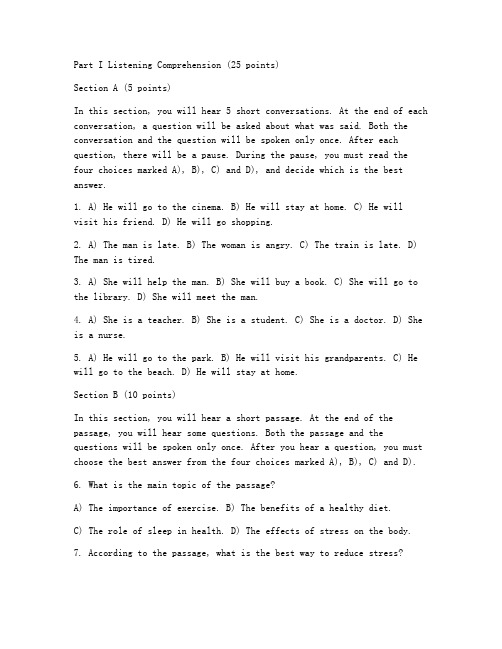
Part I Listening Comprehension (25 points)Section A (5 points)In this section, you will hear 5 short conversations. At the end of each conversation, a question will be asked about what was said. Both the conversation and the question will be spoken only once. After each question, there will be a pause. During the pause, you must read the four choices marked A), B), C) and D), and decide which is the best answer.1. A) He will go to the cinema. B) He will stay at home. C) He willvisit his friend. D) He will go shopping.2. A) The man is late. B) The woman is angry. C) The train is late. D) The man is tired.3. A) She will help the man. B) She will buy a book. C) She will go to the library. D) She will meet the man.4. A) She is a teacher. B) She is a student. C) She is a doctor. D) She is a nurse.5. A) He will go to the park. B) He will visit his grandparents. C) He will go to the beach. D) He will stay at home.Section B (10 points)In this section, you will hear a short passage. At the end of the passage, you will hear some questions. Both the passage and the questions will be spoken only once. After you hear a question, you must choose the best answer from the four choices marked A), B), C) and D).6. What is the main topic of the passage?A) The importance of exercise. B) The benefits of a healthy diet.C) The role of sleep in health. D) The effects of stress on the body.7. According to the passage, what is the best way to reduce stress?A) Taking a walk. B) Eating chocolate. C) Drinking coffee. D) Listening to music.8. How does regular exercise affect the body?A) It improves sleep quality. B) It increases stress levels. C) It decreases energy levels. D) It reduces immune system function.9. What is the author's opinion about the importance of sleep?A) It is overrated. B) It is essential for good health. C) It is a waste of time. D) It is a luxury.10. What is the most effective way to maintain a healthy lifestyle according to the passage?A) Exercise regularly. B) Eat a balanced diet. C) Get enough sleep. D) All of the above.Part II Reading Comprehension (30 points)Section A (10 points)Read the following passage and answer the questions.The Internet has become an integral part of our daily lives. It has revolutionized the way we communicate, work, and access information. However, with great power comes great responsibility. The following are some tips to help you stay safe and responsible while using the Internet:1. Keep your personal information private.2. Use strong passwords for your accounts.3. Be cautious when sharing information online.4. Regularly update your software and antivirus programs.5. Be aware of online scams and phishing attempts.11. What is the main purpose of the passage?A) To discuss the benefits of the Internet.B) To highlight the risks of using the Internet.C) To provide tips for safe Internet usage.D) To compare the Internet with other forms of communication.12. According to the passage, what is one of the best ways to protect your personal information online?A) Sharing your password with friends.B) Using simple passwords.C) Keeping your personal information private.D) Regularly changing your passwords.13. What is the author's attitude towards the Internet?A) Negative. B) Positive. C) Indifferent. D) Concerned.Section B (10 points)Read the following passage and complete the table below.The following table shows the population of different countries in 2020. Analyze the data and complete the table with the appropriate information.Country Population (in millions)China 1,439India 1,366United States 332Indonesia 268Brazil 21214. Which country has the largest population?A) China. B) India. C) United States. D) Indonesia.15. Which country has the smallest population?A) China. B) India. C) United States. D) Indonesia.16. Which two countries have the largest population differences?A) China and India. B) United States and Brazil. C) China and United States. D) India and Brazil.Part III Writing (15 points)Write a short essay on the following topic:Do you think online learning is as effective as traditional classroom learning? Give your reasons and examples to support your opinion.Note: Your essay should be about 100-120 words. You should write in a clear and organized manner, using appropriate grammar and vocabulary.。
2016-2017西城初三中考英语一模试卷
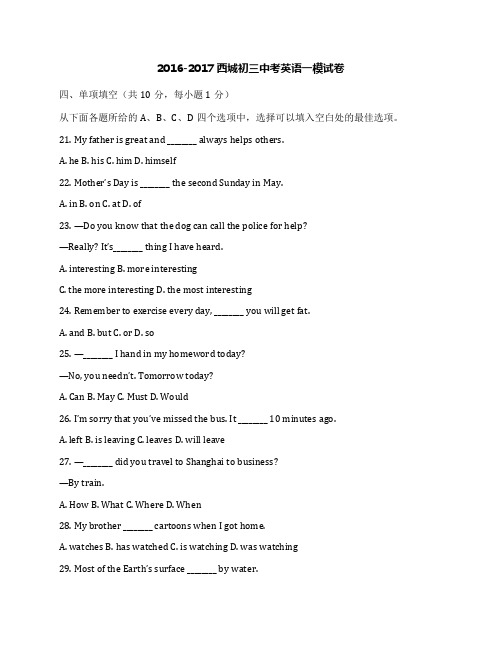
2016-2017西城初三中考英语一模试卷四、单项填空(共10分,每小题1分)从下面各题所给的A、B、C、D四个选项中,选择可以填入空白处的最佳选项。
21. My father is great and ________ always helps others.A. heB. hisC. himD. himself22. Mother’s Day is ________ the second Sunday in May.A. inB. onC. atD. of23. —Do you know that the dog can call the police for help?—Really? It’s________ thing I have heard.A. interestingB. more interestingC. the more interestingD. the most interesting24. Remember to exercise every day, ________ you will get fat.A. andB. butC. orD. so25. —________ I hand in my homeword today?—No, you needn’t. Tomorrow today?A. CanB. MayC. MustD. Would26. I’m sorry that you’ve missed the bus. It ________ 10 minutes ago.A. leftB. is leavingC. leavesD. will leave27. —________ did you travel to Shanghai to business?—By train.A. HowB. WhatC. WhereD. When28. My brother ________ cartoons when I got home.A. watchesB. has watchedC. is watchingD. was watching29. Most of the Earth’s surface ________ by water.A. coverB. is coveredC. was coveredD. covered30. —Jim, can you tell me ________?—Next month.A. when did you go on a school tripB. when will you go on a school tripC. when you went on a school tripD. when you will go on a school trip五、完形填空(共15分,每小题1.5分)阅读下面的短文,掌握其大意,然后从短文后各题所给的A、B、C、D四个选项中,选择最佳选项。
2016-2017西城初三中考英语一模试卷

四、单项填空(共10分,每小题1分)从下面各题所给的A、B、C、D四个选项中,选择可以填入空白处的最佳选项。
21. My father is great and ________ always helps others.A. heB. hisC. himD. himself22. Mother’s Day is ________ the second Sunday in May.A. inB. onC. atD. of23. —Do you know that the dog can call the police for help?—Really? It’s________ thing I have heard.A. interestingB. more interestingC. the more interestingD. the most interesting24. Remember to exercise every day, ________ you will get fat.A. andB. butC. orD. so25. —________ I hand in my homeword today?—No, you needn’t. Tomorrow today?A. CanB. MayC. MustD. Would26. I’m sorry that you’ve missed the bus. It ________ 10 minutes ago.A. leftB. is leavingC. leavesD. will leave27. —________ did you travel to Shanghai to business?—By train.A. HowB. WhatC. WhereD. When28. My brother ________ cartoons when I got home.A. watchesB. has watchedC. is watchingD. was watching29. Most of the Earth’s surface ________ by water.A. coverB. is coveredC. was coveredD. covered30. —Jim, can you tell me ________?—Next month.A. when did you go on a school tripB. when will you go on a school tripC. when you went on a school tripD. when you will go on a school trip五、完形填空(共15分,每小题1.5分)阅读下面的短文,掌握其大意,然后从短文后各题所给的A、B、C、D四个选项中,选择最佳选项。
西城中考一模英语试卷
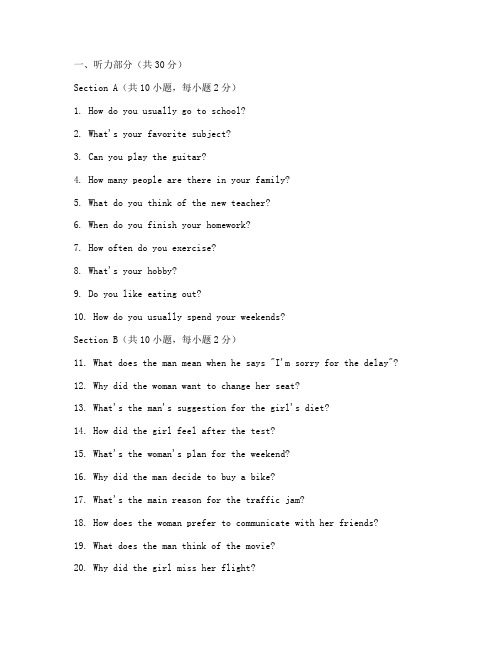
一、听力部分(共30分)Section A(共10小题,每小题2分)1. How do you usually go to school?2. What's your favorite subject?3. Can you play the guitar?4. How many people are there in your family?5. What do you think of the new teacher?6. When do you finish your homework?7. How often do you exercise?8. What's your hobby?9. Do you like eating out?10. How do you usually spend your weekends?Section B(共10小题,每小题2分)11. What does the man mean when he says "I'm sorry for the delay"?12. Why did the woman want to change her seat?13. What's the man's suggestion for the girl's diet?14. How did the girl feel after the test?15. What's the woman's plan for the weekend?16. Why did the man decide to buy a bike?17. What's the main reason for the traffic jam?18. How does the woman prefer to communicate with her friends?19. What does the man think of the movie?20. Why did the girl miss her flight?Section C(共10小题,每小题2分)21. What does the passage mainly talk about?22. What are the benefits of exercise?23. How does the author suggest reducing stress?24. What's the most important factor in maintaining good health?25. What's the main idea of the second paragraph?26. How does the author feel about the changes in the city?27. What's the reason for the girl's success in the competition?28. How does the author describe the boy's character?29. What's the solution to the problem of global warming?30. What's the main theme of the passage?二、单项选择(共30分)31. My mother always tells me to ___________ hard and I will succeed.A. studyB. workC. liveD. play32. It's ___________ for you to learn English well.A. importantB. difficultC. interestingD. possible33. He ___________ to the library every day.A. goesB. wentC. goesD. goes34. I think the movie is ___________ than the book.A. interestingB. boringC. betterD. worst35. She ___________ in the classroom when I got there.A. was playingB. playsC. playedD. is playing36. ___________ you help me with my homework, I would be very grateful.A. IfB. UnlessC. BecauseD. Although37. The teacher said that ___________ we studied hard, we would pass the exam.A. IfB. UnlessC. BecauseD. Although38. I ___________ to the party last night, but I was too tired.A. wanted to goB. want to goC. am going to goD. have gone39. ___________ you study hard, you will get good grades.A. IfB. UnlessC. BecauseD. Although40. ___________ you need any help, please don't hesitate to ask me.A. IfB. UnlessC. BecauseD. Although三、完形填空(共20分)41. I remember the first day I ___________ to the new school. I felt very ___________ because I didn't know anyone.42. The teachers were very ___________. They helped me with my studies and made me feel ___________.43. I made a lot of friends ___________ school. We spent a lot of time ___________ together.44. I ___________ my homework every day and studied hard. As a result, I ___________ good grades in the exams.45. I ___________ that hard work pays off. I will continue to work hard and make my parents ___________.四、阅读理解(共30分)A篇(共10分)My favorite animal is the panda. Pandas are very cute and they have black and white fur. They live in the mountains of China. Pandas are herbivores, which means they only eat plants. Their favorite food is bamboo.One day, I went to the zoo to see the pandas. I was so excited to see them. They were playing with each other and eating bamboo. The pandas were very peaceful and gentle. I spent a lot of time watching them and took many photos.I think pandas are very important to our planet. They are an endangered species, which means there are very few of them left in the world. We should protect them and make sure they have a safe place to live.Questions:46. What is the author's favorite animal?47. Where do pandas live?48. What do pandas eat?49. What did the author do when he went to the zoo?50. Why should we protect pandas?B篇(共10分)There are many ways to reduce waste and help the environment. One way is to recycle. Recycling is the process of turning waste into new products. This can help reduce the amount of waste that goes into landfills and conserve natural resources.Another way to reduce waste is to reuse items. Instead of throwing away something, you can use it again. For example, you can use plastic bags to store your groceries or to line your trash cans.You can also reduce waste by composting. Composting is the process of decomposing organic matter, such as food scraps and yard waste, into a rich, fertile material called compost. Compost can be used to improve soil quality and reduce the need for chemical fertilizers.Questions:51. What is the main idea of the passage?52. What is one way to reduce waste?53. What can you do with plastic bags?54. What is the process of decomposing organic matter called?55. What can compost be used for?C篇(共10分)A healthy lifestyle is important for everyone. It includes eating a balanced diet, exercising regularly, and getting enough sleep. Here are some tips for maintaining a healthy lifestyle:1. Eat a variety of fruits and vegetables.2. Limit your intake of sugary drinks and processed foods.3. Exercise for at least 30 minutes a day.4. Get 7-9 hours of sleep each night.5. Manage stress through relaxation techniques.6. Stay hydrated by drinking plenty of water.7. Avoid smoking and limit alcohol consumption.By following these tips, you can improve your health and well-being.Questions:56. What is the main idea of the passage?57. What should you do to maintain a healthy diet?58. How long should you exercise each day?59. What is one way to manage stress?60. What should you avoid to maintain a healthy lifestyle?五、书面表达(共20分)Write a letter to your friend, telling them about your summer vacation. Include the following points:1. Where you went and why.2. What you did and who you met.3. What you learned and what you enjoyed.4. How you feel about your vacation.You should write about 100 words on the ANSWER SHEET.---请注意,以上内容仅为模拟试卷,实际中考试卷可能会有所不同。
